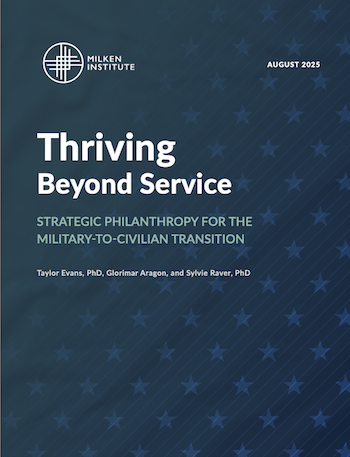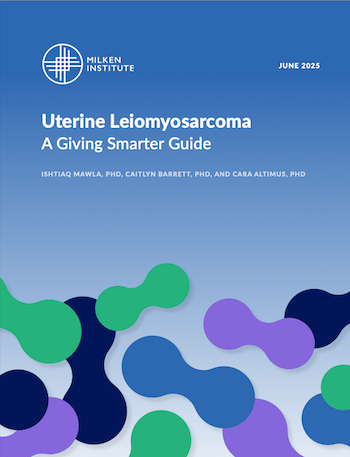Strategic Philanthropy Fall Newsletter: How Can Strategic Philanthropy Fund a Better Tomorrow?

In This Issue
Opportunities for Researchers across Science and Health
Opportunities for Philanthropic Funders: Entrepreneurial Innovation, Veteran Support, and Rare Diseases
Short- and Long-Term Capital: Balancing Urgency with Sustained Support
Summer Spotlights: Catch up with MISP
In this quarter’s issue, we’re highlighting how disbursing philanthropic capital across science and health, entrepreneurship, and innovation drives research forward and addresses our most pressing challenges. See how Milken Institute Strategic Philanthropy is shaping a better tomorrow and follow us on LinkedIn to stay updated on our progress.
Opportunities for Researchers across Science and Health
While the funding landscape has shifted in science and health since the start of 2025, we continue our work to champion funding opportunities for historically underfunded areas of biomedical research.
Now Open for Applications: Funding Opportunities with the Science Philanthropy Accelerator for Research and Collaboration (SPARC)
- For researchers studying bipolar disorder: BD2 (Breakthrough Discoveries for thriving with Bipolar Disorder) is accepting applications for the fourth round of funding for its Discovery Grant program, inviting interested researchers who study the science underlying bipolar disorder to apply for up to $4.5 million per grant, $18 million in total funding. Letters of intent are due November 21, 2025. Learn more and apply.
- For researchers studying frontotemporal dementia: The Kissick Family Foundation, in partnership with SPARC, invites independent researchers whose work is applicable to frontotemporal dementia to apply for up to $500,000 in funding over two years. Letters of intent are due November 3, 2025. Read for more information.
- For researchers interested in sarcoidosis: The Ann Theodore Foundation’s newest grant program is accepting applications from early-career faculty interested in studying the debilitating chronic inflammatory condition, sarcoidosis. The Ann Theodore Foundation Learning Opportunities in Medicine and Sarcoidosis program, in partnership with SPARC, is accepting applications to secure up to $200,000 over two years and to be paired with a faculty mentor. The application deadline is October 27, 2025. Learn more and apply.
Additional Insights from the Milken Institute Strategic Philanthropy Team on Philanthropic Support for Science Funding and Research:
- SPARC Director Emily Baxi, PhD, joined a virtual discussion with BioRender, a scientific image and illustration software company, to share practical and tactical strategies for grant-seeking researchers on how to strengthen proposals for philanthropic funding. Watch the conversation.
- President of Tambourine Philanthropies Ari Simon shared an article on philanthropy’s role in reinforcing and reinventing American research in a time of crisis. Read this article.
Philanthropy in Action: Entrepreneurial Innovation, Veterans Support, and Rare Diseases
Leveraging Prizes to Crowdsource Global Innovation: Entering a New Phase of the Milken-Motsepe Prize in AI and Manufacturing
Traditional funding often favors quick wins over bold risks. Prizes flip that model by funding outcomes, not promises, and giving innovators from every background a chance to prove what’s possible. At the Milken Institute, our prizes serve as launchpads—sparking breakthrough ideas, generating evidence, and opening the door for capital to follow.
Our latest prize, the Milken-Motsepe Prize in AI and Manufacturing, is now entering the second stage of the prize cycle: assessing highly competitive applicants and determining the top 10 who will move to the semifinal rounds. Semifinalists will be determined by the end of September, so stay tuned to see which teams will receive $50,000 to scale their AI-based manufacturing solution and get the opportunity to pitch it to investors at the Milken Institute Middle East and Africa Summit in December.
Learn more about the Milken-Motsepe Prize Program’s impact to date.
Thriving Beyond Service: Philanthropic Analysis of the Veteran Ecosystem

Transitioning out of military service is not a single moment—it’s a lifelong journey. Yet many US veterans and their families face disconnected and under-resourced support systems that can hinder their well-being. Thriving Beyond Service: Strategic Philanthropy for the Military-to-Civilian Transition, developed in partnership with the Tullman Family Office and The Duchossois Family Foundation, shares key philanthropic priorities and opportunities to highlight how funders and ecosystem leaders can work together to streamline resources, expand access to care, and unlock opportunities for veterans to build strong, fulfilling civilian lives. We interviewed more than 80 experts and analyzed funding data from over 17,000 veteran-serving organizations to identify where philanthropy can help build a more coordinated, effective transition from military to civilian life.
Giving Smarter Towards Rare Diseases: Opportunities in Uterine Leiomyosarcoma

Women living with uterine leiomyosarcoma (uLMS), a rare, aggressive, and poorly understood gynecologic cancer, often face grim prognoses. Effective care informed by a better scientific understanding of the disease is urgently needed, both of which rely on a robust funding landscape supported by philanthropic investment. Uterine Leiomyosarcoma: A Giving Smarter Guide, developed in partnership with the Briger Foundation for Oncology Research, describes the current state of research, clinical practice, and treatment approaches for uLMS and identifies critical areas where philanthropy can help.
Short- and Long-Term Capital: Balancing Urgency with Sustained Support
At the intersection of business and philanthropy, corporate giving has the rare ability to operate in two modes simultaneously—moving quickly in times of crisis while also investing in longer-term projects that strengthen communities. Natural disasters, for example, demand immediate action. Yet recovery often spans years, requiring companies to balance urgency with sustained support.
To help guide leaders navigating these pressures, we developed Navigating Turbulent Times, a report offering practical approaches for responding with confidence. Read more from our recent articles on how philanthropy can help support communities in times of crisis:
- Months after the devastating wildfires in LA County, recovery is far from over. Billions in uninsured losses and mounting long-term needs uncover where critical gaps remain. Read about philanthropy’s role in ongoing recovery.
- We spoke with leaders from Ford Philanthropy, the AT&T Foundation, the Truist Foundation, the PepsiCo Foundation, and the Virgin Unite Foundation to explore how companies are redefining their role in society and their commitment to building resilient communities. Explore key takeaways from these leaders.
Summer Spotlights: Catch Up with MISP
- Managing Director of SPARC Cara Altimus, PhD, joined the Anxious Achiever podcast to discuss stigma surrounding bipolar disorder, its complexity outside the binary definitions of “sick” or “well,” inadequate research funding, and the stated aim of BD2 to enroll 4,000 people with bipolar disorder as participants in an ongoing research study to inform individualized care for the disorder. Listen to this episode.
- Managing Director of Environmental and Social Innovation Emily Musil, PhD, joined Adam Torres on the Mission Matters podcast to share insights and next steps for the Milken-Motsepe Prize in AI and Manufacturing. Listen to this episode.
- Mary Culler, president of Ford Philanthropy, shared the power and potential within corporate philanthropy to step up and innovate in the face of disaster and crises, and in leading the charge to address challenges to communities globally, inspired by our Global Conference panel, “Strengthening Communities: Corporate Philanthropy, Social Capital, and Resilience.” Read this Fast Company article.
Up Next: Join us at Asia Summit in October 2025 in Singapore and the Future of Health Summit in November 2025 in Washington, DC, to continue the conversation on philanthropic funding challenges and opportunities across global markets, and within science and health research.